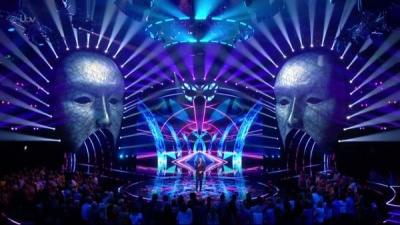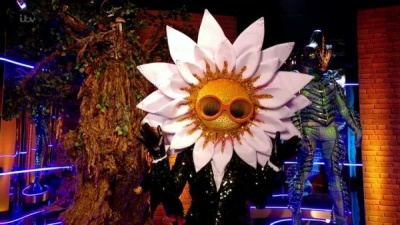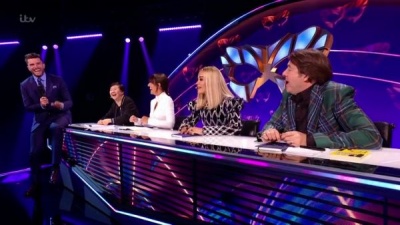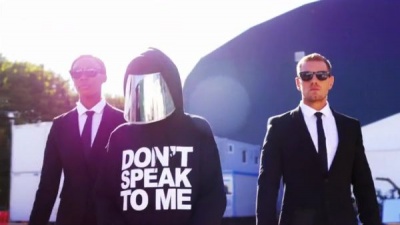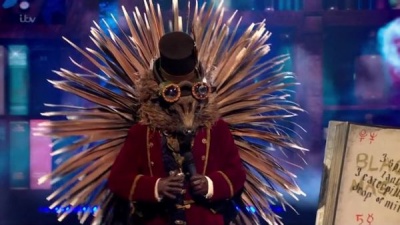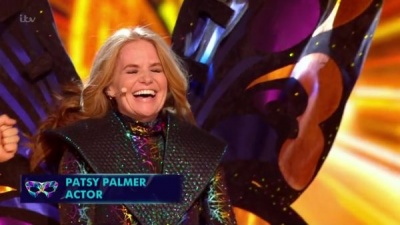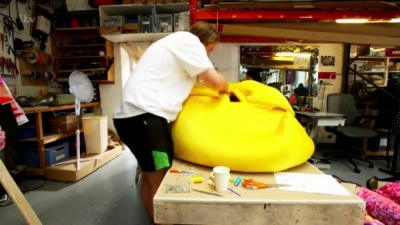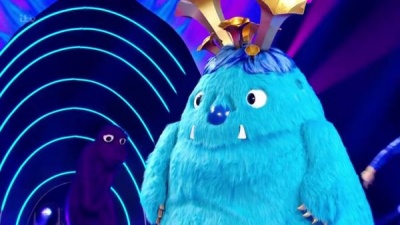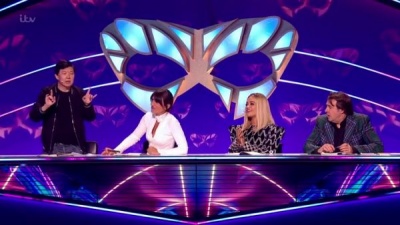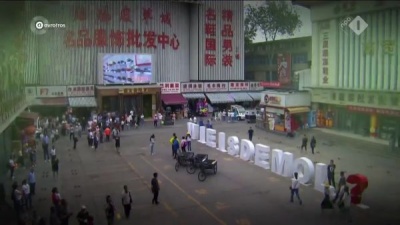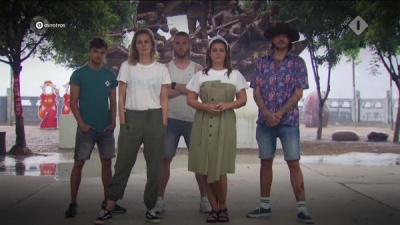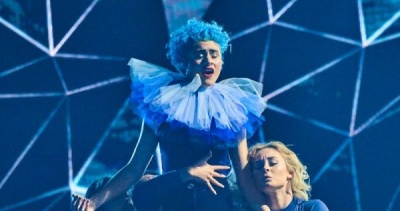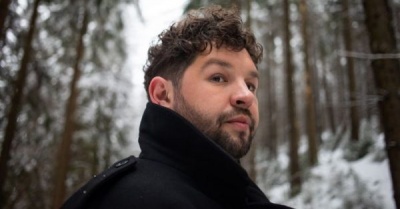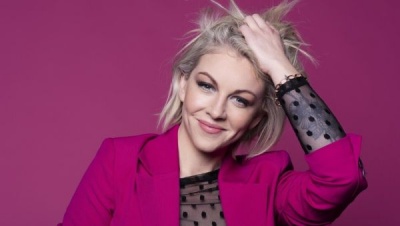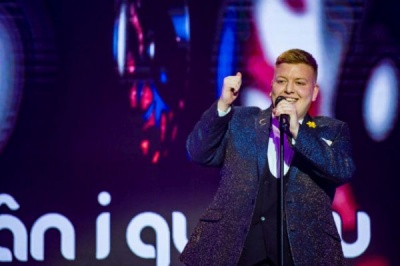Weaver's Week 2020-03-08
Last week | Weaver's Week Index | Next week
Some excellent news from Alex Trebek, who is "optimistic" that he's kicked that pesky pancreatic cancer into touch. The past year has shown just how much his good tough quiz means to the world.
We'll talk about our local tough quiz next week. For now, the biggest ratings hit of the still-young year.
Contents |
The Masked Singer
Bandicoot Scotland for ITV, 4 January – 15 February (8 episodes)
So you know how The Voice of Holland has these "blind auditions"? Where the judges can't see who is singing, all they can do is hear them?
What if that was scaled up, so that the entire audience couldn't see who is singing?
And what if it was jazzed up so that the performer was hidden away in a lavish costume?
And what if it wasn't Jill and Bill from next door, but proper A-list celebrities?
That, dear friend, is The Masked Singer, which aired on ITV in January and February.
The show traces its roots back to King of Masked Singer, which began on KBS in Korean back in 2018. The format has been transformed, passing through a Thai broadcaster where the costumes were enhanced. Then it was Murdochified on his Fox channel in north America. We saw ITV Studio's take on Fox's version of the Thai enhancement to the Korean original.
We have a dozen contestants, all celebrities to a greater or lesser degree. All perform anonymously, wearing these elaborate costumes. They're only referred to as their character, the Bee or the Blackbird or the Wick of Twisted Flax.
The contestant gives comments to camera, but their voice is put through a distorter so as not to give too much of a clue. Much of what they say is to help a side-game, can you guess who is in the costume? The judges are encouraged to share their thoughts on this matter, and only on this matter: critique of the singing is perfunctory and often entirely absent.
On ITV, The Masked Singer is an elimination contest, in the style of The X Factor. Lots of people sing in each programme, one or two are eliminated each week, and the losing contender removes their mask to reveal their identity, famous or otherwise.
Back on KBS, King of Masked Singer found a winner each week, only this champion would defend their title against new competitors on the next episode. For our money, this is a more logical way to run the programme, each show is almost entirely self-contained.
Not our favourite show ever
This column got off to a bad start with The Masked Singer: it took itself way too seriously. "This is television's most closely-guarded secret!" declaimed host Joel Dommett. "Hold my sonic screwdriver," said Doctor Who, which kept its major plots under lock and key until transmission. The Masked Singer was always going to be a game of singing and identity, only the answers might be unpredictable. We always knew roughly where The Masked Singer was going, our internal plot-nav was completely frazzled by the Doctor.
The Masked Singer continued to annoy, with its s-l-o-w pace. We've said before that each channel has its own speed – CBBC is fast, BBC1 noticeably slower, and ITV a beat slower still. It has to be, it's stretching ten minutes of content out over thirteen minutes on the clock before the next ad break. And so it was throughout The Masked Singer, it always went just that bit too slowly to hold our attention.
We tuned in expecting to hear a singing contest, as much as we expected a guessing game. Though the audience voted on the quality of the performances (and voted credibly throughout the series), the comments from the panel were entirely to do with the identity. For all we knew, the people in the costumes could have been miming to a backing track they'd recorded earlier – or to a backing track someone else had recorded earlier.
Even in their limited job, the panel were often not credible in their guesses. Would ITV really be able to get a major international A-list star like Kylie Minogue or Will Smith to do their parochial show? Of course not, but the panel kept guessing these impossible names, as if to float the idea that anyone could take part. When the answers were finally revealed – a mixture of local singers, local talent from elsewhere in showbiz, and a couple of imported stars – they weren't quite like the names billed.
At the end of each show, the defeated contestant removes their head. This moment is milked by having all the judges and audience shout "Take it off! Take it off!", like they're a mob of second formers tormenting a victim. Let's leave this bullying behaviour in its gutter, along with its progenitors like Rapids Johnson. This isn't what we want from light Saturday night entertainment.
If you're not into celebrity culture, this show will disappoint and annoy. The singing interludes are just an excuse for yet more random guessing.
...but there's plenty to like
The costumes for The Masked Singer are gorgeous, each being detailed and eye-catching. By far the best element of the programme, we have nothing but praise for the work. Tim Simpson and Cath Pater-Lancucki came up with the ideas and designs, made flesh by Plunge Creations.
The costumes reflect the contestant's chosen persona, and still allow for movement and dancing and – yes – singing. It's singing inside the costume, we never see the mouth move. And that took a bit of getting used to, we're used to cartoons where the mouth moves in rough time with the sound.
Ratings for The Masked Singer were very good by ITV's standards, and good enough to cause BBC1 some headaches – pulling their competition The Greatest Dancer earlier in the evening, and dumping Pointless Celebrities opposite.
ITV chose to make The Masked Singer all about the guesswork, and there's a very good reason why. If it's all about the guesswork, and you're playing along with the second screen thing on social media, then you have got to watch live. There's no point watching two or three days after the fact, the result has been spoiled, everyone knows that Hoverbot is played by former rugby player Anika Davenport.
There's no point watching two or three *minutes* after the fact, you'll put forward ideas about Hoverbot and everyone else will think you're talking about Parrot the next performer.
And if people are watching absolutely live, they've watching the entire 90 minutes absolutely live. And that includes the commercial breaks. ITV has bought a spectacularly successful way to make viewers watch the adverts, and congratulations to them for that.
ITV's success – in getting people to watch adverts – might be circumscribed by OFCOM's rules about where ITV can place ad breaks. The broadcaster is limited to one ad break every 15 minutes (and a total number of minutes per hour). ITV might like to sell a solo advert, charge a massive premium for *one commercial* just before the loser is unmasked. But if ITV did sell that solo advert, it counts as one of their breaks for the whole show.
When the show doesn't quite meet the hype
For this column, The Masked Singer fell into an uncanny valley. It certainly wasn't a singing show, in the style of The Voice of Holland and The X Factor. But it didn't work as a detective show for us. The audience is tasked with voting for the best singer, not the most convincing liar.
We also found The Masked Singer to be exceptionally tedious, at least when watched live. We understand the slow pace: ITV has to sell adverts, and to sell lots of adverts the show needs to spin itself out. ITV wants to sell five internal breaks, and OFCOM rules mean the show has to last 90 minutes. But there's only one task on The Masked Singer, namely singing.
Compare and contrast with Europe's biggest detective hunt, the AVROTROS massive Saturday night pastime, Wie is de Mol?. In one episode, we can get explosions of colour, people in the back of a taxi calling up Chinese restaurants in Deventer to help translate their goal, and a laser battle.
Wie is de Mol? works as an entertainment in its own right, it's got variety and light and shade. The Masked Singer is a one-trick pony. The only thing we ever get is singing, and some clues for the side-game. There's no variation, the tone is flat throughout.
When they reveal that Slightly Bent Paperclip was Kevin Soames, we think, "ah, didn't guess that. Nevermind. Bad luck. We won't win The Mask List." When they reveal that Leonie is not the mole, we think, "WAT???!!! Leonie is geen mol??!!1!!!!!!! Ongelooflijke!!!!!een!!! Niet succes!!!!!!!11!!!!!!! De enige winnende zet is niet om te spelen!!!!!elf!!!".
The Masked Singer didn't get us emotionally involved, we didn't care who won, and we didn't much care if our speculation was right. And that left us with absolutely no reason to watch the programme: it became a chore well before the final.
In spite of this column's reservations, The Masked Singer has been a success by ITV's standards, and by any standard. There will be a second series, probably early next year. We won't be watching, but we do acknowledge their success, and wish them well.
A Song For (or Against) Europe
This week, we learned that cinemas on Britain, Ireland, and Malta all combine their cinema takings to compile the "Box Office Top Ten". It's something to do with the film industry aggregating results across language areas, rather than strict geography. This makes fine sense, and we're going to apply it to the Eurovision Song Contest previews.
Four mostly-Anglophone broadcasters are competing this year: BBC (shown on screen as "United Kingdom"), RTÉ ("Ireland"), SBS ("Australia"), and PBS ("Malta"). Most have now released their song into the public sphere.
"Don't break me" was selected for SBS a month ago. It's a very memorable tune, there are loud and soft bits, it shows Montaigne's abilities both to sing and to draw out the emotions. Montaigne is an indie art-pop singer-songwriter-type. She's been a regular on alternative station Triple-J (their version of 6 Music) for about ten years.
"My last breath" was next out of the blocks, the entry from BBC. It's sung by James Newman, and reaction has been divided. There's general agreement that he's singing a song, and that it's reasonably contemporary. Wouldn't be out of place on Radio 1 or Radio 2, but nor would it leap out of the radio and demand to be heard again.
It's a good *radio* song, and that might not be a good *competition* song. Where is the call to action? Why should televoters pick up their phone and vote for this? Will the juries award big marks to a competent song, sung competently?
RTÉ's entry followed one week later. "Story of my life" comes from Lesley Roy, another sprightly female singer-songwriter. She's an experienced performer, working with Max Martin on the album "Unbeautiful" back in 2008. The staging will be by Thisispopbaby, an "innovative theatre company", and we all know the importance of good staging versus whatever the BBC sent last year. The song is really rather good. Synth riffs, euphoric vocals, and a chorus to get in your ear and stick there. That's a call to action, that's the last little bit we're missing from the BBC entry.
Destiny Chukenyere enjoys the support of the PBS viewers. She won The X Factor Malta last month. Destiny, born in August 2002, won the Junior Eurovision Song Contest in 2015 with the utterly brilliant "Not my soul". She later gave ITV's Got Talent a whirl, making as far as the semi-finals. What will her song be? Good question: PBS hasn't told us yet.
A quick look at some of the other action. Little Big, who will sing for C1R, shot up to favourites on the betting markets as soon as they were announced – and before their song emerged. Tinkety-tonk, old fruit, and down with the meddling bots.
There has been genuine grassroots support for "On fire", The Roop have tapped into the quirky indie-pop genre. They'll represent LRT ("Lithuania"). "Think about things" has been called "totally infectious", and we've already had someone copyright the joke "that's why Daði's gone to Iceland" (RÚV is the broadcaster). It's already a chart single over here, into the top 40 at number 66.
This column must declare an interest, we're paid members of the AVROTROS organisation. (€7,50 a year: a snip!) That means "our" entry is the home entry, "Grow", another slightly sappy ballad sung by an emo young man called Jeangu Macrooy. "It's not your standard verse-refrain-verse-refrain-song," said NPO Radio 2's Bart Arens. "It's a really personal song." Don't think it'll go terribly far, but then we remember being distinctly underwhelmed by "Arcade" on first hearing last year.
The Eurovision Song Contest semi-finals are on 12 and 14 May (NPO1, SBS1, PBS1, RTE2, BBC4), and the final's on 16 into 17 May (NPO1, SBS1, PBS1, RTE1, BBC1).
In other news...
The annual contest of Welsh-language song took place last weekend. Can i Gymru was won by Gruffydd Wyn, for his song "Cyn i'r llenni gau". It's a near-opera baritone, reminds us of Bryn Terfyl. Gruffydd, who wrote and sung the song, convinced us with his emotions even though we didn't understand a word he was singing.
We also enjoyed "Anochel", an energetic soft rock number, reminded us of the Manic Street Preachers. "Dawnsio'n rhydd" caught our eye, in lyric and presentation and spirit it felt like a very decent Junior Eurovision entry – and had the Wrong Sort of Shiny lights, too.
The death was announced last night of Dave Rainford of Eggheads. We'll have a fuller obituary next week.
Rotten news for telly people, as the MIPTV festival of new formats has been cancelled. The event, held at a swanky location on the Med, exposes lots of new formats to television people who might buy them, and gives them a chance to swank about in the lap of luxury for a few days. This spring's event has been pulled, because of the risk of exposing lots of television people to horrible illnesses. We'll all have to make do with clips on the interwebs, and fish 'n' chips on the seafront at Worksop.
The RTS Programme Awards nominations are out. Game shows in the final threes are:
- Children's Programme – Step Up to the Plate
- Daytime Programme – Beat the Chef
- Entertainment – Got Talent, Love Island, RuPaul's Drag Race
- Entertainment Performance – London Hughes - Don't Hate the Playaz, Stephen Mulhern - In for a Penny
- Formatted Popular Factual – The Circle
- History – Jade The Reality Star Who Changed Britain
The RTS Programme Awards will be handed out on 17 March.
BBC2 gets a pair of new shows for Sunday night, as Race Across the World and Dragons' Den return. A new look to Channel 4's Tuesday: Celebrity Bake Off is followed by dating show Five Guys a Week. Channel 4's weekdays gain new episodes of Four in a Bed and Come Dine with Me.
Dancing on Ice finishes (VM1 and ITV, Sun). And it's Sport Relief, Friday's telethon will doubtless have lots of game show-related jollity.
Photo credits: Bandicoot Scotland, AVROTROS, SBS, BBC, RTÉ, Avanti.


